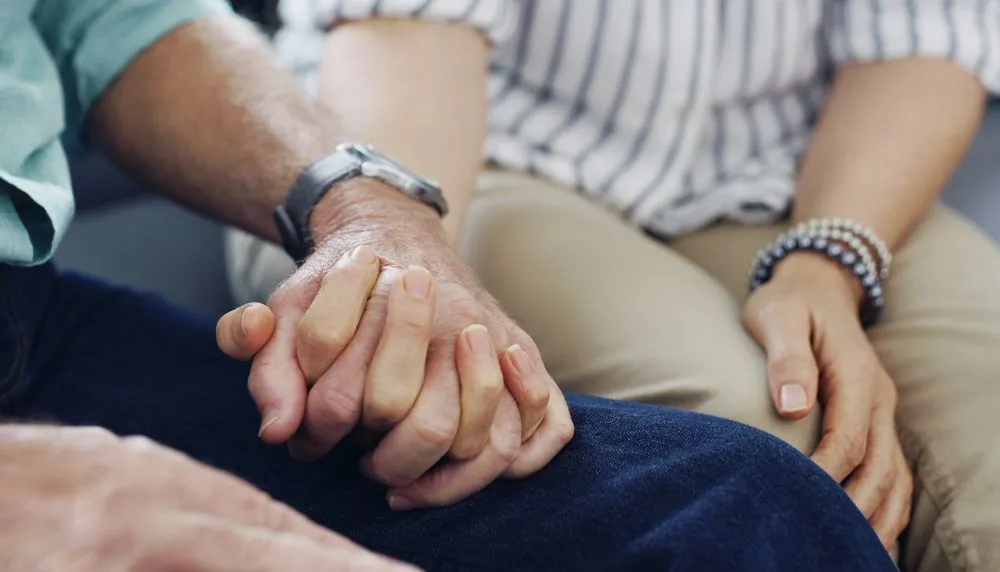When Mental Health & Cancer Meet: It’s Okay to Not Be Okay

Stock photo posed by models, sourced by Getty Images
Two navigators from our Cancer Support Helpline share strategies to help you through the ups and downs of your cancer experience.
Editor's Note: This is part of our Spotlight on Mental Health series examining critical mental health concerns that affect cancer patients, survivors, caregivers, and providers.
Each year as May rolls around, days become longer, and flowers and trees reach peak bloom. Many people have emerged from their winter cocoons and may notice an improvement in their mood. May is also Mental Health Awareness Month and, while everything may be looking up, it is a time to acknowledge the importance of honoring one’s mental health needs throughout the year, especially if cancer is also in your life.
Mental health encompasses our emotional, psychological, and social well-being, affecting how we think, feel, and act. While most people experience normal everyday ups and downs, 1 in 5 adults in the United States will experience a mental health condition such as anxiety or depression.
Hearing the news that you have, or may have, a cancer diagnosis is a devastating moment in a person’s life. Those everyday ups and downs you once had may now be complicated by the practical realities of navigating serious illness, communicating updates to loved ones, and managing feelings around planning for the future.
Receiving a diagnosis or learning that your cancer has changed can bring about many emotions. These feelings can be complicated to sort out. All the while, lives don’t stop moving — bills still need paying — and it can be all too easy to put our emotions to the side to deal with later. An already existing mental health condition could be worsened by the new uncertainty of cancer, especially if formal support is limited.
In short, it is expected that you may not be okay while balancing all of this.
Tips to Cope With Stressors
As oncology social work navigators at Cancer Support Community’s Cancer Support Helpline, people share stories with us that include other components of their lives that impact their mental health and wellness. Dynamics that were occurring long before cancer entered their lives have an impact on their mood and coping abilities such as:
- Being caregivers themselves to aging parents or young children
- Experiencing loss in the form of divorce or with the passing of a loved one
- Managing life transitions such as with jobs changes or family planning
- Navigating the highs and lows of being an emerging adult
When cancer arises, it may occur alongside these other life stressors that are common life experiences for many of us.

It can be helpful to know some coping strategies that can be used in moments when you are not feeling okay. Asking yourself, “How can I improve the moment?” can help to pause and redirect your focus on something that can help reduce the distress temporarily. This may include spending time in nature by going for a walk, taking a shower or bath, calling a loved one, writing, or listening to music.
Mindfulness is the practice of noticing the present moment or an emotion for exactly what it is, without feeling the need to change how we are feeling or push the emotion away. Developing a regular mindfulness practice can be beneficial to understanding how to balance intense feelings. Smart phone apps such as Insight Timer or Calm are great resources to get started.
Or try our guided yoga and meditation videos, designed with the needs of people impacted by cancer in mind.
It is also important to know when you may need to turn to formal support. Some signs that it may be time to talk with someone include:
- Feeling unable to control your thoughts or worries
- Sleeping less or more than you are accustomed to
- Eating more than usual or not having an appetite at all
- Finding it difficult to complete basic daily tasks
- No longer enjoying activities you once enjoyed
Your cancer center may have oncology social workers available to offer practical and emotional support. You can ask your oncologist or nurse navigator for a referral to the oncology social worker to be connected. Your primary care provider is another great resource for referrals to community mental health providers.
NOTE: If you or someone you know is thinking about suicide, experiencing depression, or feeling a loss of hope, call or text the Suicide & Crisis Lifeline at 988, or chat with a counselor from the 988 Suicide & Crisis Lifeline. They provide 24/7, free, and confidential support to people in suicidal crisis or emotional distress anywhere in the United States.
How Our Helpline Can Provide Cancer Support
Our Cancer Support Helpline is staffed with community navigators and resource specialists who are here and ready to support you by phone at 888-793-9355 and online via our live web chat service. Our Helpline staff can offer emotional support and share personalized resources that may be helpful in coping with difficult emotions that can come with cancer.
A few ways we can help include:
- Linking you with one of our CSC or Gilda's Club locations across the country that provide free support programs to anyone impacted by cancer
- Helping you find a therapist in your community or online if you prefer
- Finding a peer mentor, matching you with someone who has been through a similar experience
- Offering support and guidance around talking openly with your oncology team, primary care doctor, or any of your other care providers about how you are feeling.
Remember, it’s okay to not be okay sometimes. We are here to support you through the ups and downs of your cancer experience.